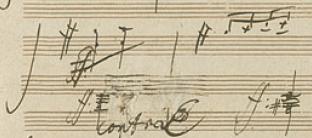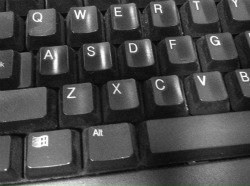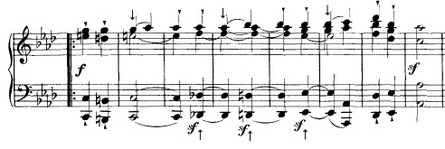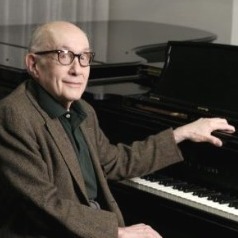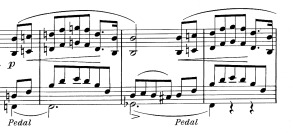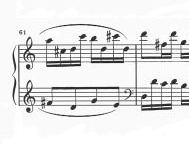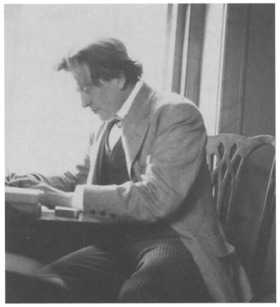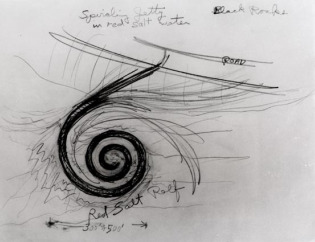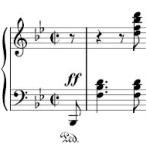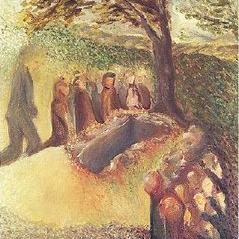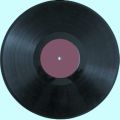There is music that suffers in performance from conventionally good music-making. Mainstream classical playing seems to rely on clichés of "musicality" -- arching every phrase, breathing between groups, tracing all those lines up and then down again. Some pieces need different treatment. The first movement of Beethoven's Opus 101 is an extended, wordless run-on sentence. Theoretically, we may understand that no satisfying cadence in A major … [Read more...]
Clover V
In considering the ways today's art is an art of appropriation, let's notice a basic change that's occurred in writing, composing, and design. Editing used to involve re-writing, re-typing, re-drawing -- physically copying some previously used material into each new version. Computer-enabled editing techniques now mean that the virtual copying and pasting of material from one version of a project to another is routine whether we're working with … [Read more...]
Voice Mis-Leading
Some solo piano music has part-writing that seems to correspond directly to music for string quartet. In such keyboard music, there are a constant number of "voices" tracing coherent individual lines. Beethoven: Opus 110 These voice-parts have integrity. We can follow tenor or bass, alto or soprano (viola or cello, second violin or first violin). This is a modern practice in keyboard music, I believe. The earliest keyboard pieces -- … [Read more...]
Pat head, rub tummy
Within solo piano music, it happens that the individual must play two very differing things at the same time. In Beethoven's Opus 110, the right and left hands have different patterns of articulation and emphasis. For me, it would be best if the heavy, syncopated comic accents in the left-hand music do not in any way affect the folk simplicity of the paired-note articulation above, in the highest voice in the right hand part. In doing these … [Read more...]
Jacob Lateiner (1928-2010)
Jacob Lateiner died this morning in New York. He was 82. The following passages are from my 1998 essay about his teaching: "In a sense, Jacob Lateiner does not give piano lessons. The piano is a tool for him. It's a means or an obstacle to singing, speaking, and (fuga!) flying. In lessons, Jacob aims to be neutral. Part Socratic (or Talmudic?) questioner, part Freudian analyst (to the exactly punctual end of each session), Jacob allows his … [Read more...]
Intertext
In his anxiety, Johannes Brahms read the slow movement of Ludwig van Beethoven's piano sonata, opus 10, number 3, and penned his own intermezzo in E-flat Minor, opus 118, number 6: (If D goes to C-sharp, then D Minor can go to E-flat Minor. Up can be down. 6/8 and eighth-notes, or 3/8 and sixteenths. Largo e mesto. Dies Irae? D-Es?) Earlier misprision led Brahms from playing the slow movement of Beethoven's Opus 2, number 2, to … [Read more...]
Luigi Beethoven — postmodernist
Before, I've speculated that many of Beethoven's texts read as parody -- a mockery of 18th-century styles and practices. In some postmodern music -- John Zorn or Rzewski's People United -- musical styles, harmonic behaviors, or keyboard textures come on and off like readymade shirts in a fitting room. Though now it may be harder to discern (our subtle reception of old stylistic distinctions may be dulled), Beethoven does something … [Read more...]
Widescreen
The 4:3 television screen ratio came to represent present tense -- the "narrow slit of 'now'," to use Bill Viola's term. With the increasing preponderance of widescreen 16:9 ratio, those of us who spent thousands of formative hours with the cathode-ray norm find that video suddenly got more narrative. With the new proportions, since the information in view is just a little too much (too wide) to see in a glance, my entire sense of the medium and … [Read more...]
Costly Imitation
As I listen to others play the piano, as I eat, or walk down the sidewalk -- all I think of is the passage of music I struggled with yesterday, a passage I have been playing at least for 25 years. I consider it from many angles, rolling it over in my mind. To be completely cognizant and conscious of every detail in a complicated scripted piece that's played by memory is to be safe. Is it after all a misguided act? To reprise these … [Read more...]
Early adopters
A composer in his twenties tells me he doesn't use "technology" in his music -- no samples, no interactive computer applications. To me, it's concerning. At a recent Music with a View concert at the Flea Theater, there was new music by three composers using varying amounts and means of interaction between electronics and live performance. In the Q & A after the concert, Morton Subotnick mentioned that he had dreamed of this new world -- a … [Read more...]
Recenter
The "reception" of a piece of music becomes part of its identity. Our performances, recordings, reviews, reactions, lawsuits, teaching, reflection, arrangements, remixes, appropriation -- all of that is the piece, along with the text we started from. Famous music acquires a larger and larger, and more multiply-determined identity. Eventually, there are so many components that none of us can affect the whole very much. When I give the first … [Read more...]
One Hand
From the school's library I checked out again the copy of Messiaen's Le merle noir (The Blackbird) that I used last fall when I played the piece with Paula Robison. Since then, many markings were made in the piano part. I don't mark anything in the scores I use, but when I opened the music again there were all the things pianists write: dark circles drawn around printed dynamic markings, fingering, penciled-in lines showing correspondences … [Read more...]
Matter of opinion
After several master classes at the Ecole Normale de Musique in Paris, given by several of us pianists, a student asked me: "Isn't it all just a matter of opinion?" And after so many diverging ideas and approaches, strongly expressed, who could blame anyone for asking that question? With so many differences, perhaps opinions just seem like ... random thoughts? I told him what I believe. "In music -- or politics, or anything -- the 'best' … [Read more...]
One note at a time
The work of the performer may seem repetitious. We are measuring out time with our playing and practicing. We are measuring out life, one Beethoven sonata at a time. In a sense, am I measuring my way toward death with my performances? I might speculate: "Will I play Beethoven's "Pathétique" Sonata a hundred times more before I die?" Or five times? Or never? Arnold Schoenberg: Gustav Mahler's Burial, 1911 Of course, all kinds of people … [Read more...]
Withdrawn
Sometimes a piece of music is "withdrawn" from a composer's catalog. Music that was composed, published, and available is taken back -- rescinded. You can't get it anymore. Usually, the composer has thought better of it: the music doesn't hold up now, the composer's style has changed a lot, it's an early piece that just doesn't seem good enough for public display... All of Philip Glass's early non-tonal music is unavailable now. I play(ed) a … [Read more...]

